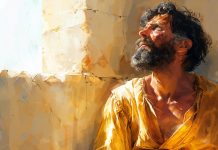“If anyone, then, knows the good they ought to do and doesn’t do it, it is sin for them” (James 4:17).
“Cheap grace[1] is the deadly enemy of our church. Cheap grace means grace sold on the market like cheapjacks’ wares”[2] (Dietrich Bonhoeffer).
Paradoxically, the author of this spiritual unrest spent much of his life in a struggle with political implications. As a martyr and a symbol of undisguised courage, Dietrich Bonhoeffer continues to intrigue, arouse interest, provoke heated debate, and challenge consciences. His life, death, and philosophy have made him a figure with a tragic destiny.
The idealist
Bonhoeffer was born on 4 February 1906 into a large aristocratic family, the son of a psychiatrist father and a mother of noble birth who encouraged their eight children to develop independent and critical thinking. And Dietrich did so diligently. His dream of becoming a theologian remained unchanged, although his parents would have preferred a musical career for him, and his siblings tried to discourage him by pointing out that the Church was weak and unimportant. He replied, “Then I will reform it”.
The perfectionist
He began his theological studies at the Protestant University of Tübingen, continued them in Rome and Berlin, and finally earned a doctorate in theology. He was just 21. Just three years later he received the title of Privatdozent.
In the same year (1930) he went to New York for a few months, an experience that had a decisive influence on his whole life. He spent a lot of time in the black communities of Harlem and was impressed by their commitment to serving those affected by the economic crisis. The gospel, Dietrich found, spoke to people regardless of their social or national status. This inspired his desire to be involved in the lives of the marginalised and discriminated against, which would later lead him into the political arena[3].
One of his American friends, Paul Lehmann, noted in an interview[4] Dietrich’s joviality, but also his contempt for mediocrity. When he failed his driving test twice, Paul suggested that he give the driving instructor some money. Dietrich refused, saying it seemed immoral. As a result, he failed a third time.
The explorer
Returning to Berlin, he lectured at the university, but in a way that was unprecedented in the German theological world. He had a meditative approach to the Scriptures and a concern that transcended the narrow interest in the Church. In this way he went beyond the limits of the Lutheran theology on which he was initially dependent, both in the relationship between church and state[5] and in the Jewish question[6].
Sometime between 1931 and 1932, Bonhoeffer was marked by deep inner turmoil and underwent a profound process of conversion. His sermons became more and more incisive. From the pulpit of the Church of the Holy Trinity in Berlin, he denounced the trap of formalism into which Luther’s church had fallen: “We do not see that this Church is no longer the Church of Luther”[7].
In a letter of January 1936, Bonhoeffer retrospectively analysed his “evangelical experience”: “Then something happened, something that has changed and transformed my life to the present day. For the first time I discovered the Bible… I had often preached, I had seen a great deal of the church, spoken and preached about it—but I had not yet become a Christian”[8].
These were the powerful effects of his New York experience. He was no longer interested in abstract debates, but in the practicalities of Christian living. Out of these reflections came in 1937 his theological masterpiece, The Cost of Discipleship, written largely as a commentary on the Sermon on the Mount. Bonhoeffer addressed the spiritual sickness of the age—cheap grace.
The fighter
His meteoric career took a turn for the worse in 1933. Unlike most Germans, Bonhoeffer foresaw the catastrophe that Adolf Hitler represented. His pacifist views against Nazi aggression led him to dissent, leaving the mainline Protestant Church (which was subservient to the Führer) and joining what was symbolically called the “Confessing Church” (along with Martin Niemöller and Karl Barth). Some suggested he stay in the mainstream church and fight from within. “If you board the wrong train, it is no use running along the corridor in the other direction”[9] was his reply.

Bonhoeffer sought a peace he couldn’t find. The apolitical (neutral), survivalist position of the Confessing Church seemed to him insufficient and unbiblical: “The theologically motivated silence about the deeds of the state must be broken at once (…) Open your mouth to speak for the speechless. Who else in the Church remembers that?” He was convinced that every Christian must confront evil in order not to participate in its triumph by remaining silent. His voice became increasingly uncomfortable, both inside and outside the church. Those close to him found it increasingly difficult to understand him, unable to decipher his theological ideas, which were manifested in every aspect of his life, private and public[10].
His pacifist convictions began to cost him. After Kristallnacht[11] he realised that silence could not be the solution: a Church that did not defend the Jews could not call itself the Church of Christ. Increasingly under the scrutiny of the Gestapo, he was able to save himself at the request of some American friends. He responded to their invitation in 1939 by crossing the ocean to teach a series of theology courses. His friends hoped that his impetuosity would die down. But despite their urging, Bonhoeffer soon left the US and returned to his homeland just before the outbreak of the Second World War. He was determined “to share in the suffering of the German people”[12]. He was soon deprived of the right to teach at the University of Berlin. He was then forbidden to speak or write in public. For many, these might have been insurmountable obstacles. For him, they were motivation.
The spy
The more he learned about what the Nazis were doing, the more unsettled he became and the more his ethical dilemmas grew. He used to say that when a madman drives a car into a crowd, as a theologian you can’t limit yourself to nursing the wounds of the dying. The important thing is to take the wheel from the driver. So he decided to join the conspiracy against the state. In 1940 Bonhoeffer decided to join the Abwehr, Germany’s intelligence service. He did this in order to carry out his conspiratorial work in the interests of the resistance movement. He managed to establish contacts with the Allies in order to prepare the overthrow of the regime, which was to begin with the assassination of Adolf Hitler.
He was aware that his efforts would make him guilty of murder. He gave theological reasons for his actions, believing that whichever option he chose, “man becomes guilty, and in either case he can live only by the grace of God and forgiveness”[13]. He thus accepted the responsibility of a tragic destiny.
The martyr
In 1943, Bonhoeffer was arrested and imprisoned on charges unrelated to his subversive activities[14]. Even in prison, he continued his meditative habit of devoting at least half an hour a day to a verse from the Bible. Imprisoned in Tegel (18 months), then in the Gestapo prison (4 months), then in Buchenwald (7 weeks) after the failed assassination attempt of 20 July 1944 led by von Stauffenberg[15], Bonhoeffer’s links with the conspirators could no longer be concealed. Compromising documents were discovered and he was sent to Flossenbürg concentration camp.
Hitler personally gave the order for Bonhoeffer to be tried and executed. An SS tribunal found him guilty of high treason. Less than 24 hours before he left this world, Bonhoeffer was carrying out his pastoral duties. A Catholic and an atheist, fellow sufferers, asked him to do so. He prayed and commented on two texts from the Bible[16]. One of those present recalled many years later that Bonhoeffer “spoke to us in a way that touched the hearts of us all”.
On the morning of 9 April 1945, just weeks before Germany surrendered, Bonhoeffer was hanged with other opponents of the regime[17]. He was only 39 years old. “He was, without exception, the finest and most loveable man I have ever met,”[18] one of his fellow prisoners later said.

The final testimony about Bonhoeffer came from Dr. H. Fischer-Hüllstrung, a witness to the execution: “At the place of execution, he again said a short prayer and then climbed the few steps to the gallows, brave and composed. His death ensued after a few seconds. In the almost fifty years that I worked as a doctor, I have hardly ever seen a man die so entirely submissive to the will of God”[19].
Those who knew him or analysed his life recognise his merits, even if his final answer remains dilemmatic. One of those who knew Bonhoeffer well said that his death could be considered an act of martyrdom, the result not only of belief in an idea, but of “sacrifice for the sake of a justified humanity”[20]. Bonhoeffer is now one of ten twentieth century Christian martyrs whose statues adorn the west entrance to Westminster Abbey in London.
Despite the posthumous accolades he received, the dilemmas arising from his involvement in a political plot with controversial stakes remain. In a meeting with readers, Metaxas (one of Bonhoeffer’s biographers) tried to unravel the conundrum by offering a contemporary example: “Suppose someone in the church foyer is trying to kill people. Should a Christian just say, ‘I’ll pray about it’ and not do anything? Or should that Christian grab the gun to stop the man in the foyer from killing more people?” He also quoted Bonhoeffer’s famous phrase: “Silence in the face of evil is itself evil“.
The politician
Some couldn’t get past the German theologian’s political involvement and plans, which from some perspectives run counter to Christian principles. For many Christians, the German theologian’s choice is paradoxical. The protest of some pastors in Bielefeld in 1948 against an initiative to name streets after Bonhoeffer is significant in this respect. They justified their position by saying that they did not want the names of their brothers who had been murdered for their faith to have the same status as the names of political martyrs. Participation in the conspiracy to physically eliminate Hitler was, and still is, sensitive. Some have tried to minimise the theological dilemmas it raises by arguing that Bonhoeffer’s role was rather marginal, reduced to a diplomatic sphere in line with his strongly pacifist convictions. In other words, the label of potential assassin cannot be applied to him[21].
Bonhoeffer’s legacy is a great challenge. The ethical dilemmas he faced can arise at any time, even in different circumstances. It is therefore essential not only to identify possible similarities with the times in which he lived, but also to assess in advance and decide on the necessary and appropriate reactions and attitudes in such circumstances.


















